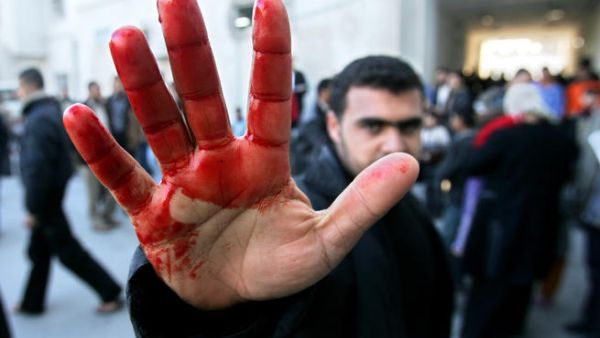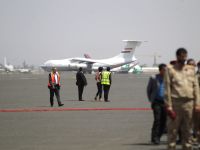A state-appointed committee in Egypt concluded on Tuesday that the police used excessive force against pro-democracy protesters in a report on their conduct during the unrest that forced president Hosni Mubarak to step down.
The report was the first official account of the mass demonstrations that began on January 25 and eventually ended the autocratic 30-year rule of Mr. Mubarak on February 11.
The report said 846 protesters were killed and more than 6,000 wounded. Authorities had initially put the death toll at almost 380. Twenty-six policemen were also killed, according to Reuters. “What is confirmed is that Mubarak’s permission [to use live fire on protesters] must be obtained. The shooting lasted for several days, and he did not hold accountable those who fired live rounds,” Judge Omar Marwan, the committee’s secretary general said at a news conference.
“That confirms his involvement in responsibility,” he said.
“If [the bullets] did not kill the victims, they maimed their faces and destroyed eyes,” the report said, adding that hospitals reported “a large number of eye injuries” from gunshots, Agence-France Press said.
Mr. Marwan said snipers from a counter-terrorism unit belonging to the now dissolved State Security apparatus were deployed against protesters.
The report also accused police of intentionally running over protesters with their vehicles.
Many of the events described by the Fact Finding Mission, which took more than two months to compile the report, unfolded on live television and came as no surprise to Egyptians who witnessed the revolution.
The committee, which was appointed by the former president’s cabinet before his ouster, found that plainclothes police and officials with the now disbanded National Democratic Party organized a mob attack on protesters in Cairo’s Tahrir Square.
The melee in the iconic square on February 2 became known as the “Battle of the Camel” after men on horseback and camels attacked the pro-democracy protesters camped there.
The report’s summary did not accuse officials by name, but Mr. Marwan said the committee had submitted a list of dozens of officials accused of involvement in the crackdown to the general prosecutor.
“The right of peaceful assembly is a recognized and basic human freedom,” the committee said in its report, which will be used as evidence in court trials and investigations by the Public Prosecutor.
“It is needless to say that the incidents of shootings and the consequential deaths throughout the events of the January 25 Revolution breached legally mandated regulations,” it said.
Mr. Mubarak, 82, was last week remanded to 15 days’ preventive custody in a hospital room on suspicion of involvement in the deaths of protesters. He was hospitalized last week after aggravation of previous heart troubles.
Aside from the former president, a growing number of former regime figures, including his two sons Alaa and Gamal, have been detained or put on trial over the crackdown and corruption.
The 47-year-old Gamal, a former investment banker, had risen in the ruling party’s ranks over the past decade and was widely seen as his father’s heir to the presidency.
Egypt’s former interior minister Habib al-Adly and four other senior officers are already facing trial on charges of killing protesters during the uprising.
The report said police officers were ordered to withdraw from the streets, while looting was under way, to create chaos and instill fear in the nation to thwart the protests.
The report offered various explanations for the escape of thousands of inmates from 11 of the country's 41 prisons. These included hardcore criminals who fueled a surge in crime that endures to this day, The Associated Press said.
One of those explanations hinted to the involvement of the Palestinian Hamas Islamist Movement and the Lebanese Hezbollah armed group in the mass escape of prisoners, the Egyptian state TV said.
On Tuesday, prosecutors questioned former spy chief Omar Suleiman, who was briefly vice president in Mubarak’s last days in office, in connection with violence against protesters, the general prosecutor’s office said, according to AFP.
Human rights activists said the report was a significant step toward holding the former administration accountable, one of the central demands of the protesters.
Hafez Abou Saeda of the Egyptian Organization of Human Rights said the report would help the state prosecutor bring many former officials to justice.
“This report is very well done. It will be one of the foundations for judicial trials and will be cornerstone to holding those responsible accountable,” he told Reuters.
Amnesty International, meanwhile, said in a report that Egypt must immediately investigate human rights abuses blamed on State Security—the domestic intelligence agency—during Mr. Mubarak’s rule, AP reported.
Thousands of protesters stormed State Security offices in Egypt last month following reports that its officers were destroying documents that could convict them if they were ever tried on charges of human rights abuses.
By Abeer Tayel








